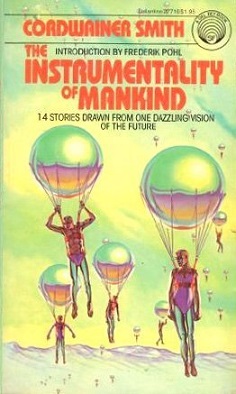
The Instrumentality of Mankind
Cordwainer Smith
238 pages
published in 1979
Cordwainer Smith was one of the more interesting science fiction writers of the fifties and sixties. Under his real name, Paul Linebarger, he had been instrumental in the development of psychological warfare, worked in China in WWII to coordinate military intelligence there, became a confidant of Chiang K'ai-Shek and consulted for the US Army in the Korean War. His science fiction reflected his life, much more literate and creative than was the norm in the genre at the time, influenced by Chinese literature and culture among other things and not afraid to be poetic, especially in the titles.
Smith had a real knack for creating gorgeously strange far future worlds, on display here even in the earliest story in the novel, "War No. 81-Q, written in 1928 when he was still in high school. Most of his stories, including the majority here, are set in the same universe, The Instrumentality of Mankind as in the title. It's a future that stretches out from 2000 AD to 16000 AD, with the Instrumentality itself established around 5000 AD. There's almost no continuity with our own time, though two stories here do star timelost refugees from the collapse of nazi-Germany, the Vonacht sisters, in "Mark Elf" and "The Queen of the Afternoon", set early in the revitalisation of humanity after the devestation of the Ancient Wars that had destroyed civilisation.
All the instrumentality stories in this volume, from "No, No, Not Rogov! to "Drunkboat" are in chronological order, with the non-Instrumentality stories bunched up at the end of the book. Short text pieces connect each of the first couple of the Instrumentality stories with each other. To be honest, the stories here aren't the best Cordwainer Smith has written. As the back cover makes clear, The Instrumentality of Mankind was the last in Del Rey's seventies republishing of Smith's oeuvre and some of these stories clearly are leftovers.
But these aren't bad stories and although this isn't perhaps the best volume to try Smith with, there's enough merit here to pick it up if you find it. Otherwise, there's the NESFA Press collection The Rediscovery of Man which has all of Smith's stories in one convenient volume.
Stories in this volume: